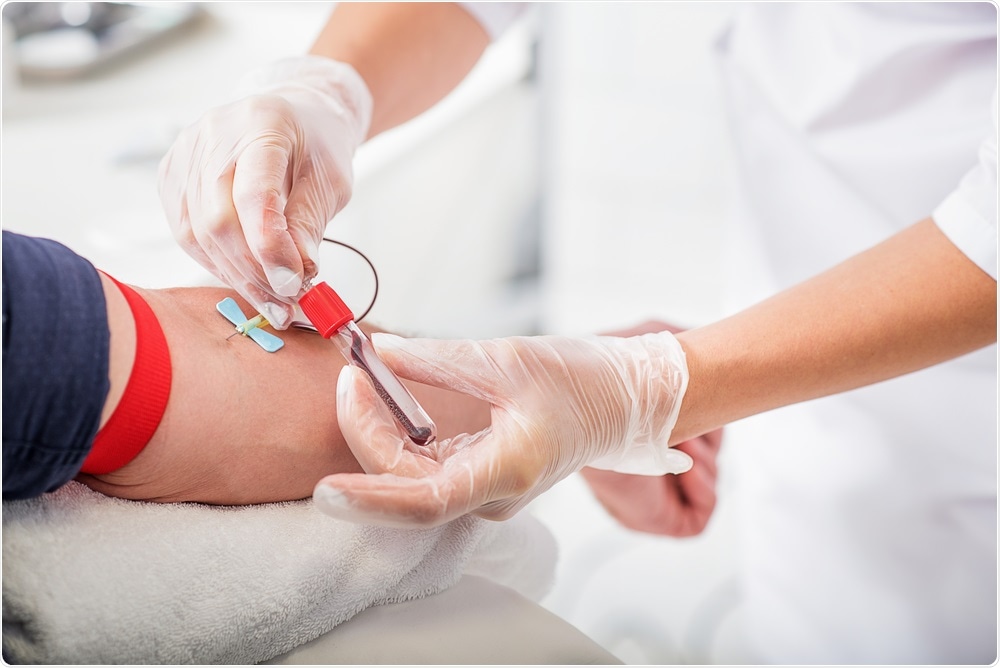
Image Credit: Olena Yakobchuk / Shutterstock
The world is gripped by the COVID-19 pandemic that has affected over 8 million individuals and led to over 436,000 deaths. In almost one-third of the persons with SARS-CoV-2 infection, there are overwhelming immune reactions followed by hypercoagulation or increased coagulation and clot formation. This is said to be due to the imbalance of hormones that regulate salt and water balance in the body as well as blood pressure.
The enzyme receptor and the virus
Researchers at Imperial College London will conduct the study. The team explained that the virus uses the ACE2 receptors to enter the host cells. ACE stands for angiotensin-converting enzyme. The two hormones angiotensin (1-7) and Angiotensin II, are responsible for salt and water balance in the body as well as blood pressure regulation and control. As the virus invades the host cells using ACE2 receptors, it disables the enzyme. This leads to an imbalance of both angiotensins (1-7) and II which in turn leads to a hypercoagulable state within the body. There is increased blood clotting, which clogs up the blood vessels.
The drug
The drug called TRV027 is manufactured by the Pennsylvania based company Trevena. Co-found of the company, Robert Lefkowitz was the winner of the 2012 Nobel Prize in Chemistry. This new molecule has been found to restore the imbalance between the angiotensin (1-7) and II and thus affects the blood pressure and control of the coagulation state.
In COVID-19, there is excess angiotensin II that leads to the hypercoagulation, say experts. It causes stickiness of the blood cells, especially in the lungs that clogs the airways and blood vessels, which is challenging to treat. TRV027 has a double action and blocks the angiotensin II activity and also mimics the activity of angiotensin(1-7). The latter is known to oppose the action of angiotensin II.
What happens in the study?
Study leader Dr. David Owen explains that there is a distinct hormonal imbalance seen in patients with COVID-19 who have been admitted with life-threatening blood clots. There is also an overwhelming inflammatory reaction, he said. Dr. Owen said that it is this hormonal imbalance that predicts who will get severely ill and who will not. Those with heart disease are found to be more prone to getting severely ill with COVID-19, says the British Heart Foundation, and the key lies in this hormonal imbalance.
Dr. Owen said, “This virus poses a huge challenge for researchers because so much about it is unknown. In order to fight it, we need a team effort. This project has brought together pathologists, virologists, pharmacologists and researchers who usually focus on the heart and circulatory diseases. Drawing on this range of expertise will give us the best chance of finding a desperately needed treatment for COVID-19.”
The new drug TRV027 could prevent lung damage as well as the blood clots, the researchers believe. For this pilot clinical trial, 60 patients will be recruited. These participants have been confirmed with a diagnosis of COVID-19. Each of the patients would be followed up closely for a period of eight days when the symptoms of the disease typically worsen, requiring ICU admission and even ventilation. This period is known as the critical period of the infection. The patients would be divided into two groups – one would receive the experimental drug, and the other group would receive placebo explained joint study leader Dr. Kat Pollock, Senior Clinical Research Fellow in Vaccinology and Honorary Consultant at Imperial College London.
Dr. Pollock said that COVID-19 is a complex disease, and more than one organ system is usually affected. The drug has been found to be safe among those with heart failure, say the researchers. Pollock said, “We need to move away from thinking of COVID-19 as solely a respiratory illness – it also has devastating effects on the rest of the body, including the blood vessels and heart. When this infection was first described, we were surprised to learn that people with heart and circulatory diseases appeared to be at risk. Our study will play an important role in understanding the mechanisms which make Covid-19 dangerous and offers a potential treatment.”
Other drugs in use and in the pipeline
Several drugs are in different phases of clinical trial and use among patients with COVID-19, given the aggressive nature of the pandemic. At present, there are around ten different antiviral drugs, including drugs used in HIV, such as lopinavir/ritonavir, which are being used among patients with COVID-19.
The antiviral drug against Ebola, Remdesivir, has also shown promise in several studies and is being used against COVID-19 infection. Remdesivir has been known to attack an enzyme within the virus that helps it to replicate within the body.
Another novel avenue of therapy includes the use of convalescent plasma from those who have recovered from the infection and have sufficient antibodies in their blood. It has been found to benefit some patients who are critically ill with the infection.
COVID-19 also typically causes an overwhelming of the immune reaction leading to what is called a cytokine storm. Several drugs are being used to target the cytokine storm and reduce the risk of critical illness.